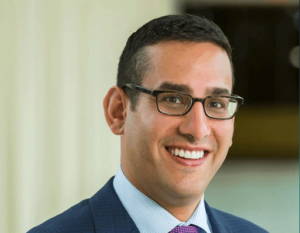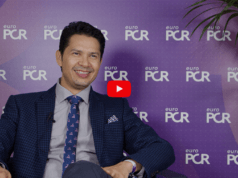
Interventional cardiologist Amir Kaki (Heart & Vascular Institute, Detroit, USA) shares insights from his own career, and those of other leaders in the field, about the knowledge and skills needed to navigate the “business” of cardiology.
As a practicing interventional cardiologist and clinical professor, my career has largely centred around cardiac haemodynamic support, complex coronary interventions, and peripheral vascular disease management.
I stepped into the field of cardiology nearly two decades ago. Reflecting on my journey, especially now, from a position where I balance both clinical and leadership responsibilities, I often think about the broader landscape of healthcare.
One aspect that stands out is the business side of it, an area fresh interventionalists typically come out of their fellowship unprepared. Yet, this facet of medicine, from operational management to healthcare economics, significantly impacts our ability to deliver care.
In this article, I’ll touch on insights that accomplished cardiologists shared in interviews with FastWave Medical on the business concepts they wished they had grasped better upon completing their fellowships. I’m hoping this will offer some guidance that goes beyond the usual clinical training.
Understand how hospitals make money
Babar Basir is the director of the Acute Mechanical Circulatory Support Program at Henry Ford (Detroit, USA), specialising in complex coronary interventions, including chronic total occlusions and advanced mechanical circulatory support devices. Basir is a national leader in the treatment of cardiogenic shock and frequently speaks on podium about the use of temporary pumps for heart failure.
”The business side of healthcare is something we’re not taught in medical school—and I’m not a business person, so my understanding of it remains limited, even after six or seven years,” Basir comments. Although counterintuitive, understanding the financial underpinnings of healthcare institutions and the income mechanics is paramount for physicians.
Basir practices in an academic setting. That’s why he’s partly protected from the pressure of Relative Value Units (RVUs). Still, he acknowledges the importance of ”production“ for the institution.
For him, medical education should enhance its curriculum to include business acumen, especially for those in private practice. Physicians must understand their role within the larger corporate structure of healthcare systems. He says: “You put in all this hard work, but at the end of the day, you’re an employee.”
Basir concludes with a vital piece of advice: ”It’s essential to know your rights and be mindful of the business perspective so you can feel secure and comfortable in your workplace.”
Be your own PR team
Jesse Kane is the assistant professor of medicine and an interventional cardiologist at the University of Vermont Medical Center (Burlington, USA) and a former athlete who captained the Israeli National Men’s Lacrosse team—establishing the sport in Israel during his medical studies at Tel Aviv University. His research and interests focus on the optimal management of complex coronary disease and interventional complications.
”Being a great doctor is just not enough,” says Kane. For him, it’s the interpersonal skills and public relations acumen that are needed the most, particularly for those in specialty fields. In the business of medicine, one presents oneself to others, not just in terms of treatment but also in interpersonal interactions.
”It’s about having good, clear communication and connections with your referrals,” Kane notes. On top of answering clinical questions, you need to be proactive in communication to ensure that the doctors who refer you are comfortable with your patient management, and know that they will be informed about the treatment developments.
Kane emphasises that being a physician, you need to build a trusted brand for yourself. He notes: “Especially in a specialty field, you really have to have a brand and a personality that people recognise and feel comfortable with.” And such recognition largely depends on effective communication with referrals.
”You also need to be ready to justify yourself to the administration, especially when requesting specific equipment,” Kane continues. For that, you need to understand the financial implications of your decisions and be able to justify how your decisions benefit patient care within the constraints of the institution you’re working for. ”Those things don’t really come up during a fellowship, but you quickly realise them when you’re attending,” he concludes.
Evaluate incentives beyond your contract
Rhian Davies is an interventional cardiologist at WellSpan Health in York (USA), where she also serves as the director of complex coronary. She completed her medical training at Penn State Milton S Hershey Medical Center (Hershey, USA), Warren Alpert Medical School of Brown University (Providence, USA), and the University of Washington (Seattle, USA), with a specialised focus on chronic total occlusion (CTO) percutaneous coronary intervention (PCI). Her expertise includes radial access, mechanical circulatory support, and complex coronary and CTO procedures.
Davies sheds light on an often-underestimated aspect—contract literacy. It’s vital to thoroughly understand the contract details such as the goals of the practice, details of your salary, as well as how it’s structured before diving into a new position. Only then you can align your personal and professional expectations with the realities of a new role.
Beyond the basics of the contract, Davies emphasises the importance of setting personal and professional milestones: “It’s important to set personal goals for developing your programme or business within the healthcare system you’ve joined,” when starting a new position. She suggests new practitioners should strategise their growth by considering key questions about their practice’s development, “How many cases you aim to handle, where your patients will come from, and how they will learn about your services.”
Lastly, Davies highlights the critical role of accessibility in building a successful practice. For her, ensuring mutual accessibility between the doctor and patients is essential. “Ensuring you’re as accessible to your patients as they are to you is vital for building a successful practice and delivering care to patients who might not be aware of your specialty or existence,” she notes. This is foundational for developing a thriving medical practice and achieving high-quality patient care.
Optimal ways to engage with hospital administrators
Ravi Hira is a well-published interventional cardiologist at Pulse Heart Institute (Seattle, USA) specialising in complex coronary disease. He stands out by offering treatment options to patients who may not be surgical candidates. He’s also the director of the Cardiac Care Outcomes Assessment Program (COAP) in Seattle.
”Your perspective on your profession shifts over time, and it’s interesting to compare where I am now to where I was ten years ago,” shares Hira. “When I came out, I was operating on my survival instincts, both for myself and my patients. I wasn’t thinking much about programme development or resource management; those came with time.”
His experience taught him that navigating relationships with administrators in healthcare is crucial. administrators typically focus on short-term gains, operating on a two-year cycle to demonstrate profit or benefit for upward mobility. ”They’re often looking to move up to the next level after showing some profit or benefit within that period,” Hira explains.
Unfortunately, this short-term focus, Hira points out, can often conflict with the long-term sustainability of healthcare programmes. ”The easiest way in any industry to show profit is by cutting costs, which doesn’t always align with the needs of a healthcare programme,” he notes. It’s a common dilemma: budget constraints may hinder necessary investments in technology or equipment.
”It was eye-opening to understand the financial perspective behind decisions like starting an ECMO (extracorporeal membrane oxygenation) programme,” Hira shares. The administration’s perspective often differs significantly from the physicians’—it’s usually about the budget within a two-year cycle. “So maybe the take-home message is just go into that eyes wide open and try to understand the incentives behind the folks that you’re collaborating with in that setting,” Hira concludes.
Must-have skills: Coding and billing
Mirvat Alasnag is the first female interventional cardiologist in the Gulf region and the director of the Catheterization Laboratory at King Fahd Armed Forces Hospital (Jeddah, Saudi Arabia). Her expertise is widely recognised across various cardiology societies, including the Saudi Arabian Cardiac Interventional Society and the European Association of Percutaneous Cardiovascular Interventions (EAPCI).
“I work in a public facility where coding and billing are not central to what we do. However, I recognise the value of understanding these processes,” Alasnag shares. She notes that current fellowship programs are beginning to address this gap in training—coding, billing, and medico-legal education. Hopefully, as more institutions start to address administrative and legal aspects of healthcare, we will have a more business-savvy generation of physicians who are as competent in managing their careers as they are in caring for their patients.
The common thread is obvious: there’s a gap between medical training and the realities of healthcare delivery as a business. Understanding this side of medicine is important to create sustainable practices that serve both patients and providers. With a more holistic view—one that includes financial literacy, building relationships, and advocating for our practices—we, as practitioners, can make more informed decisions and ultimately deliver care with confidence.
Amir Kaki is an interventional cardiologist at the Heart & Vascular Institute in Detroit, USA. He is the director of mechanical circulatory support and high-risk coronary interventions at Ascension St. John Hospital in Detroit. Kaki is board-certified in seven specialties, including interventional cardiology, cardiovascular medicine, nuclear cardiology, and vascular medicine. He has been published in numerous peer-reviewed journals and is a frequent speaker at national meetings. Kaki is also an assistant professor of medicine at the Wayne State College of Medicine in Detroit. His clinical and research interests include high-risk complex PCI, large-bore access, intravascular imaging, and zero and low-contrast PCI. He is also an expert in alternative vascular access as well as various platforms of mechanical circulatory support including percutaneous left ventricular assist devices and ECMO.
Amir Kaki is a consultant to FastWave Medical.












